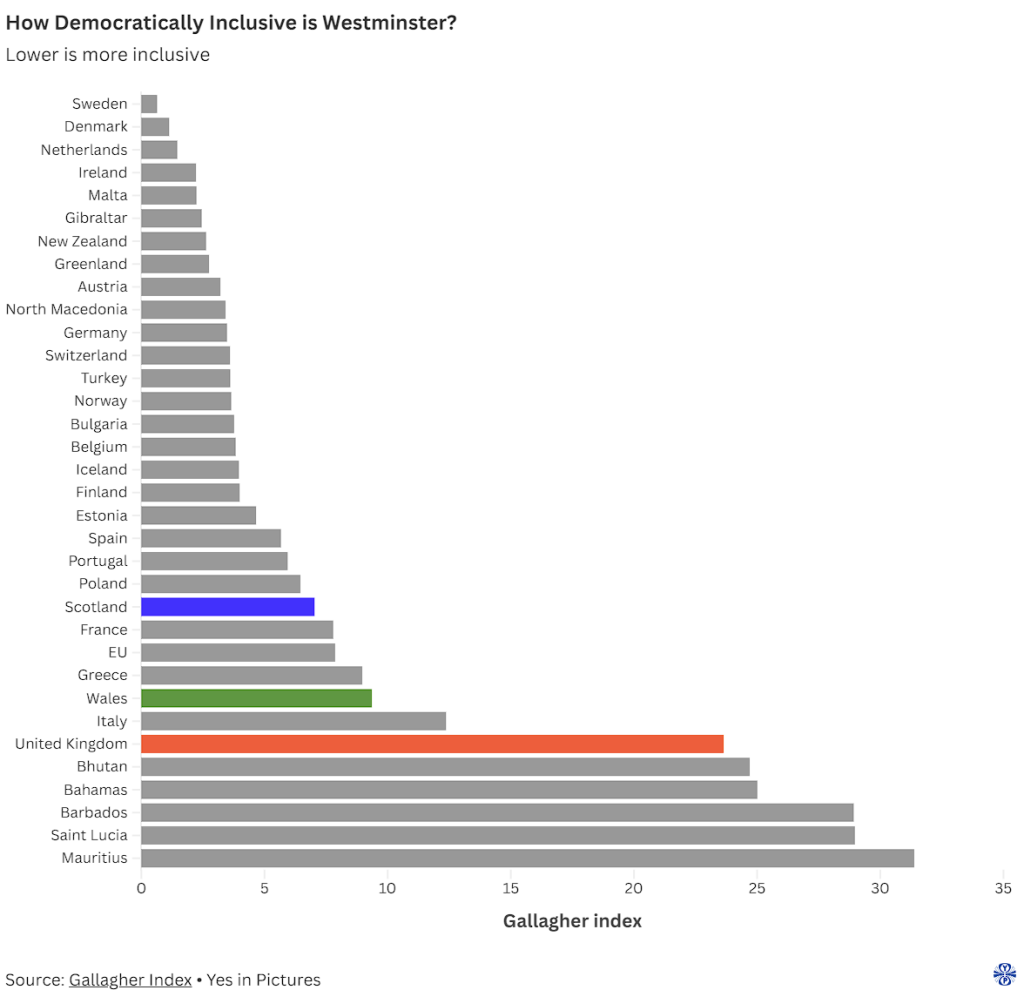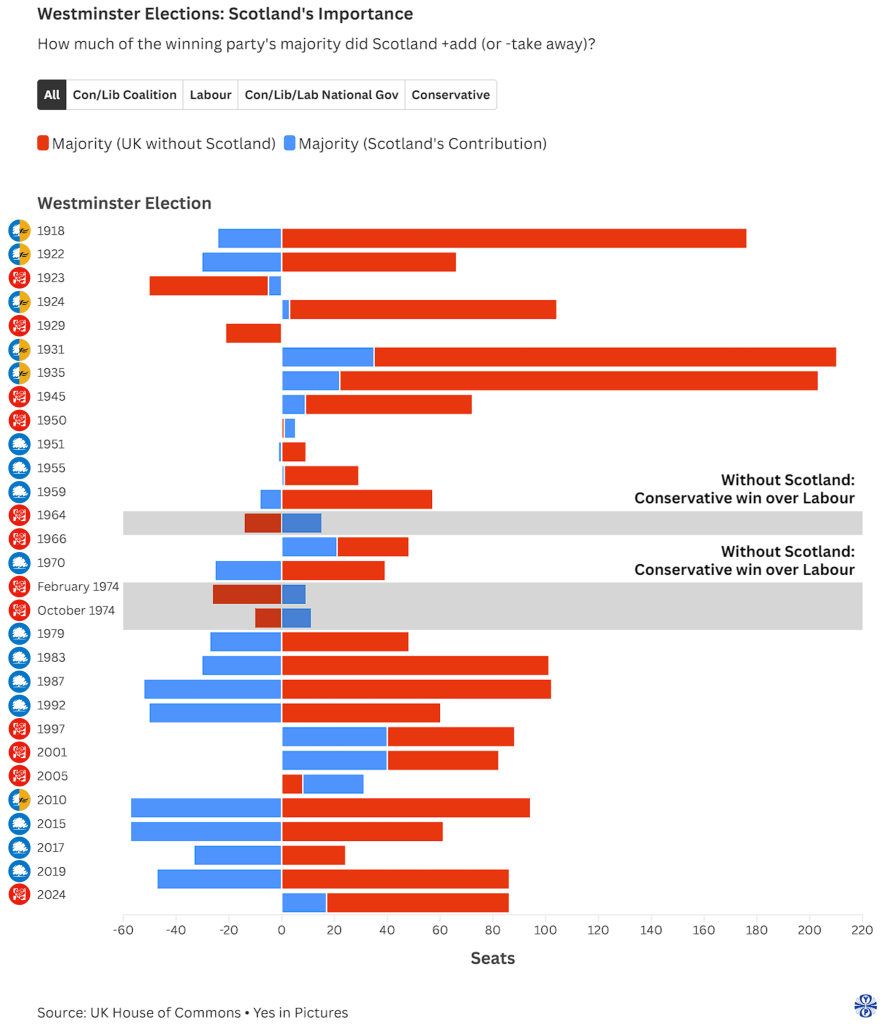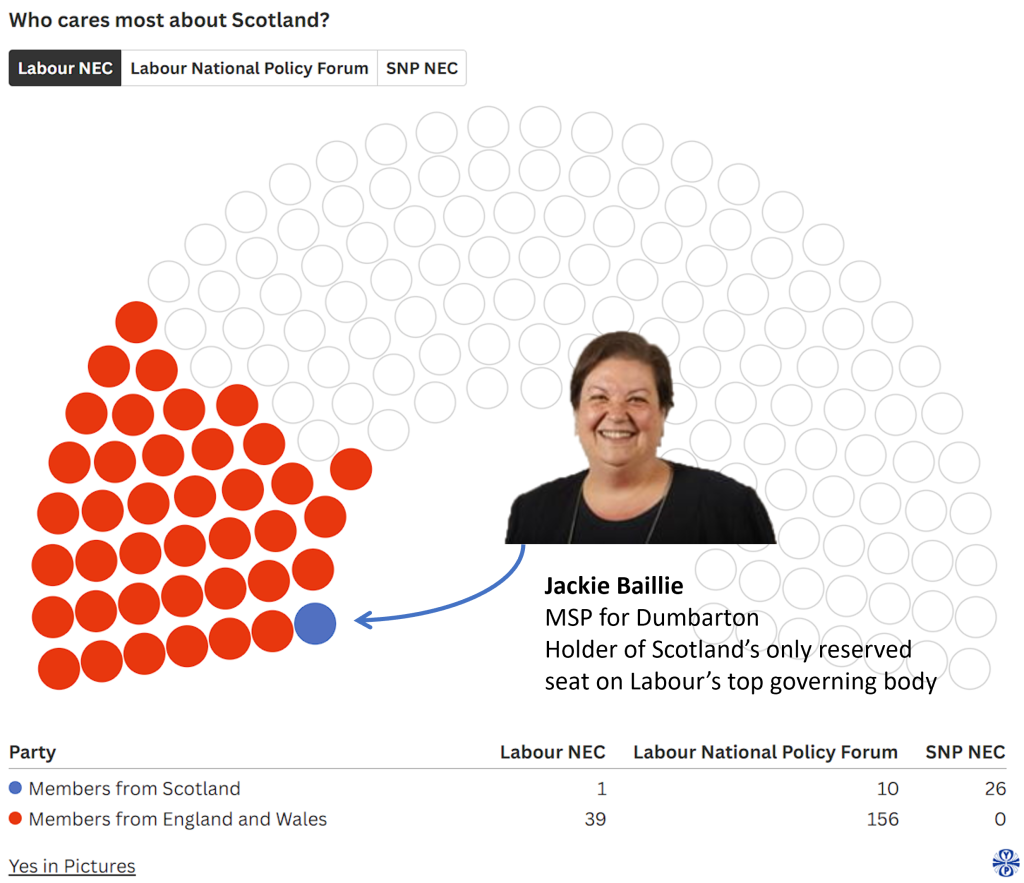Since WWI Labour has only needed Scotland in three elections to gain power in Westminster. The Tories never have. So how important is Scotland to them?
Westminster has a pretty much uniquely unrepresentative election system. By any measure it ends up at the bottom for voter inclusion. Take the Gallagher Index for example: Westminster is rated slightly above Bhutan at the bottom of this index. Compare this with any other European country. Even Scotland – which mixes Proportional Representation (PR) with some of Westminster’s legacy First Past the Post system (FPTP) – is rated much better.

Until Ireland’s independence at the beginning of the 20th Century the Conservatives and Liberals (Whigs) took turns. The Liberals often needed Irish seats to win power – but neither needed Scotland. So what happened after Ireland became a Sovereign State?
Scotland’s importance to Labour and the Tories
Westminster’s legacy election system means that the party with most seats across the UK wins power. If it has less than an overall majority the result is call a “hung parliament” and it can still try to take power (and occasionally does – although not usually for long).
In a PR election system Scotland’s votes for each party would simply add to the total and would count the same as any other in the UK. But with Westminster’s FPTP system, Scotland’s “seats” are only important to the winning party if it would not win without them.
If the winning party wins enough seats in other nations (particularly England), it doesn’t matter what happens in Scotland. This is the normal situation. In fact of the 29 Westminster elections since the end of WWI, Scotland’s seats have only been needed in three:
- 1964 General Election
- February 1974 General Election, and
- October 1974 General Election.
In each case, without Scotland’s contribution to the party majority, Labour would have lost to the Conservatives.
Let’s look at each winning party’s seat majority outside Scotland, and compare it with its seat majority from Scotland. For example in 1955 the Conservatives won an overall UK majority of 29 seats – but in Scotland it only won a majority of 1 seat. So the overall majority without Scotland would actually have been 29-1 or 28 seats.

In the chart below you’ll see that for 1955 the overall impact of Scotland is the contribution of 1 for the overall majority of 29.

The Tories would be much more successful without Scotland
In general, when Scotland’s “majority” contribution to the winning party is negative, it means that party is less popular in Scotland than the other nations. This is very much case when the Conservatives are the winning party – just look at those big negative outcomes in Thatcher’s era from 1979, and more recently Tory wins from 2010.
In these elections Scotland is returning many more MPs for other parties than the winning Conservatives. But nonetheless the Tories had a big enough overall majority to still take power in Westminster. Scotland has no impact – it isn’t required for power.
Mostly, Scotland is irrelevant to Labour as well
In general, when Labour wins power in Westminster, Scotland provides a contribution to Labour’s overall majority. However without this contribution Labour would still have an overall majority.
There are three exceptions shown in the post-war period above. Let’s look at these in a little more detail:
The 1964 General Election saw Harold Wilson from Labour winning a very small overall majority of only one seat. In Scotland, Labour won an overall majority of 15 seats. So without Scotland, Labour would have lost its overall majority. Furthermore Labour only won 13 more seats than second placed party, the Conservatives. So without Scotland, Labour would not have won power.
The two 1974 General Elections resulted in a similar close-run result – with Labour only being able to claim power because of the majority of seats it won in Scotland.
So Scotland is slightly more interesting to Labour than the Tories. But look how Labour’s organised and you’ll see that it really has no influence, despite this occasional history of being important to power.

Of the 40 seats on Labour’s top National Executive Council only one is reserved for Labour in Scotland. This is currently held by Jackie Baillie. Not even the leader of Labour in Scotland (Anas Sarwar) has a place reserved for him.
Scotland is mostly irrelevant to power in Westminster
For the Tories, Scotland has always been irrelevant to gaining power in Westminster. For Labour, even without Scotland it would have virtually always won power. And when it does, Scotland has next to no influence on its policies.
Is it any surprise that neither party pays attention to Scotland’s priorities? Of course Scottish parties like the SNP are only interested in what Scotland wants – but when these parties are part of our Government they have very limited “devolved” powers to implement these priorities.
For parties that do pay attention to what Scotland want – and can fully act on them – we need independence.

Leave a Reply